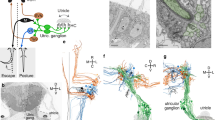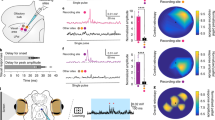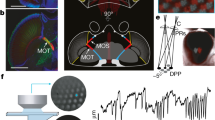Abstract
THE cybernetic principles involved in the control of locomotion in vertebrates include feed-forward and feedback between the optic and vestibular systems, through a series of control centres, including the cerebellum. Cephalopod molluscs also show swift and well controlled locomotion and have eyes and static organs, but there is little detailed evidence as to how the information from these controls movement. The basal lobes of the supraoesophageal part of the brain are known to be higher motor centres, but this is, at best, a vague term. The new studies of these lobes and of the statocyst by my colleagues and I that are reported here show more clearly the part they play in the control of behaviour. Their organisation proves to be basically similar to that of the comparable systems of vertebrates.
This is a preview of subscription content, access via your institution
Access options
Subscribe to this journal
Receive 51 print issues and online access
$199.00 per year
only $3.90 per issue
Buy this article
- Purchase on Springer Link
- Instant access to full article PDF
Prices may be subject to local taxes which are calculated during checkout
Similar content being viewed by others
References
Packard, A., Biol. Rev., 47 241–307 (1972).
Ito, M., in The Nervous System, 1 (edit. by Tower, D. B.), (Raven, New York, 1975).
Collewijn, J., J. exp. Biol., 52, 369–384 (1970).
Fukada, J., Highstein, S. M., Ito, M., Expl Brain Res., 14, 511–526 (1972).
Maekawa, K., and Simpson, J. I., Brain Res., 39, 245–251 (1972).
Dijkgraaf, S., Experientia, 19, 29 (1963).
Messenger, J. B., exp. Biol, 53, 789–796 (1970).
Boycott, B. B., Proc. R. Soc., B 153, 503–534 (1961).
Messenger, J. B., in The Anatomy of the Nervous System of Octopus vulgaris (by Young, J. Z.), 481–506 (Clarendon, Oxford, 1971).
Hobbs, M. J., and Young, J. Z., Brain Res., 55, 424–430 (1973).
Messenger, J. B., and Woodhams, P. L., J. Physiol., Lond., 259, 20–21P
Young, J. Z., Phil. Trans. R. Soc., B 276, 351–398
Sperry, R. S., J. comp. physiol. Psychol., 4, 482–489 (1950).
von Holst, E., The Selected Papers of Eric von Holst, 1, (trans. R. Martin, Methuen, London, 1973).
MacKay, D. M., in Handbook of Sensory Physiology, 7, (edit. by Jung, R.), (Springer, Berlin, 1973).
Woodhams, P., thesis, Univ. Sheffield (1975).
Matus, A. I., Tiss. Cell. 5, 591–601 (1973).
Boycott, B. B., and Young, J. Z., Symp. Soc. exp. Biol., 4, 432–453 (1950).
Messenger, J. B., Proc. R. Soc., B 167, 252–281 (1967).
Young, J. Z., Proc. R. Soc., B 152, 3–29 (1960).
Budelmann, B.-U., Forschritte der Zoologie, 23 84–96 (1975).
Braitenbeig, V., Progr. Brain Res. 25, 334–346 (1967).
Author information
Authors and Affiliations
Rights and permissions
About this article
Cite this article
YOUNG, J. The ‘cerebellum’ and the control of eye movements in cephalopods. Nature 264, 572–574 (1976). https://doi.org/10.1038/264572a0
Received:
Accepted:
Published:
Issue Date:
DOI: https://doi.org/10.1038/264572a0
This article is cited by
-
Comparative 3D microanatomy and histology of the eyes and central nervous systems in coleoid cephalopod hatchlings
Organisms Diversity & Evolution (2015)
-
Consensus Paper: The Role of the Cerebellum in Perceptual Processes
The Cerebellum (2015)
-
A Hypothetical Universal Model of Cerebellar Function: Reconsideration of the Current Dogma
The Cerebellum (2013)
-
The predictability of evolution: glimpses into a post-Darwinian world
Naturwissenschaften (2009)
-
An angular acceleration receptor system of dual sensitivity in the statocyst ofOctopus vulgaris
Experientia (1985)
Comments
By submitting a comment you agree to abide by our Terms and Community Guidelines. If you find something abusive or that does not comply with our terms or guidelines please flag it as inappropriate.



